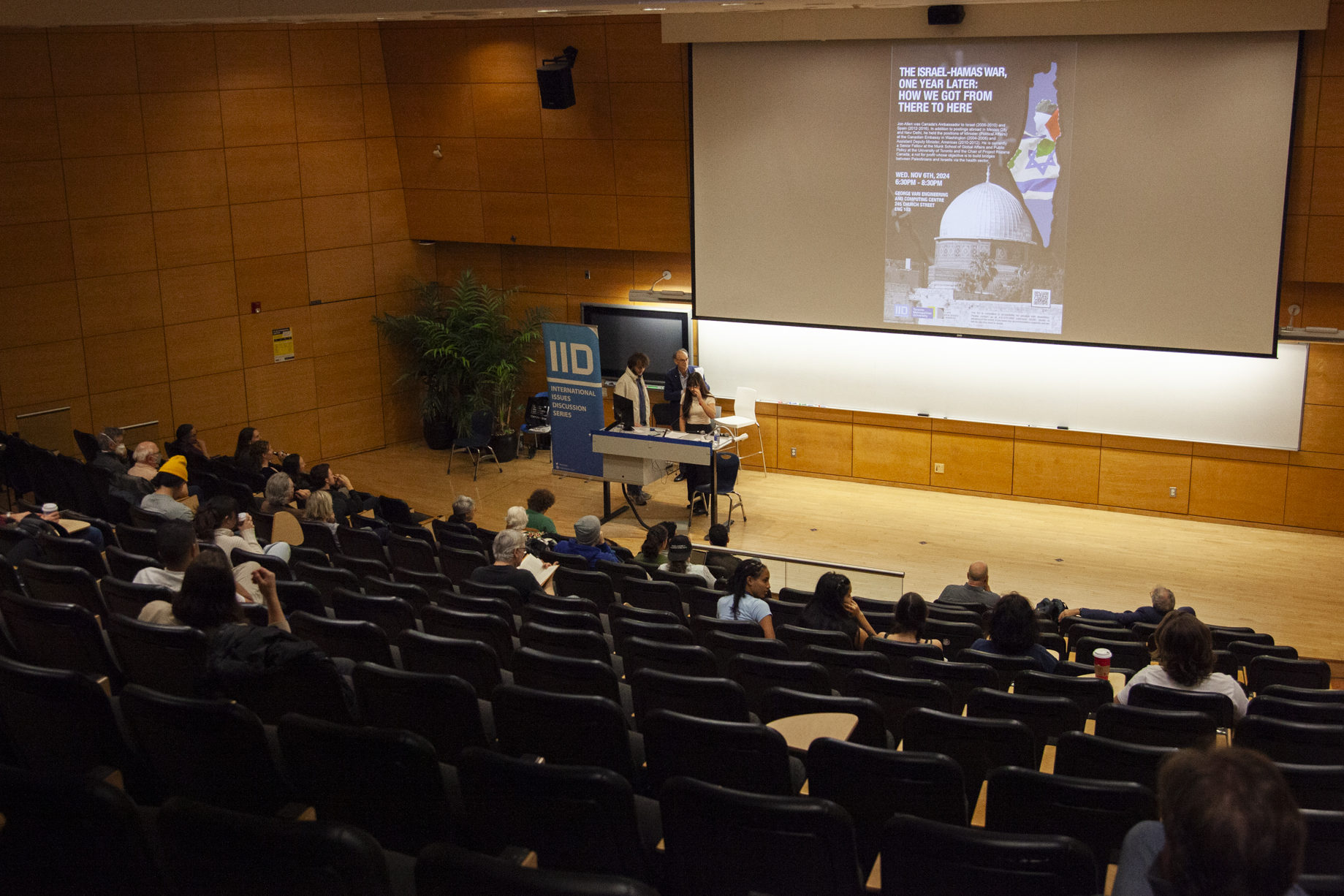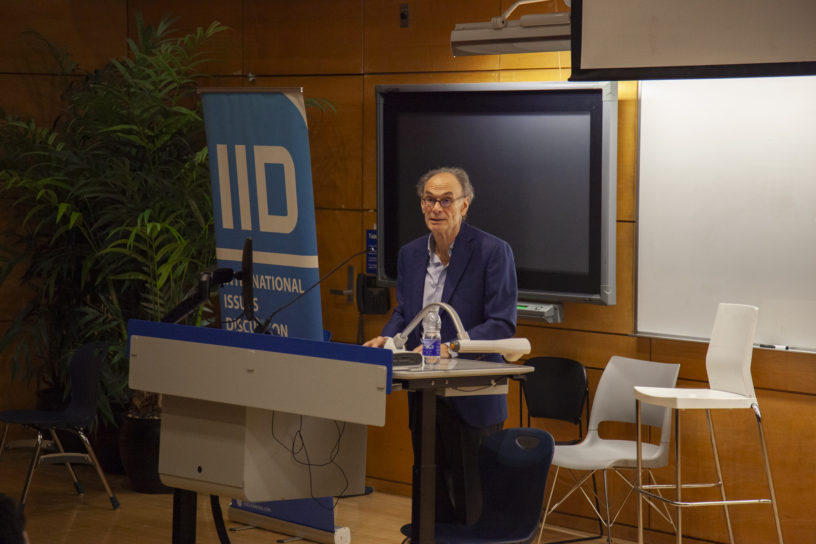By Jerry Zhang
Former Canadian ambassador to Israel and senior fellow at the Munk School of Global Affairs at the University of Toronto (U of T), Jon Allen, spoke at an event called The Israel-Hamas War, One Year Later: How We Got From There to Here on Nov. 6. The lecture examined the historical roots of the ongoing war, narratives on both sides, recent developments and challenges to peace in the region followed by an audience Q&A period.
The event was held in the George Vari Engineering and Computing Centre. It was hosted as a part of the International Issues Discussion (IID) series—a student-led forum between Toronto Metropolitan University (TMU) and U of T—that aims to foster dialogue on global issues according to Jordan Le Roux, a fourth-year history student at TMU and one of the event’s organizers at the event.
Le Roux said the IID chose to have Allen speak at the event because of his past participation with the IID and his work experience as ambassador, in human rights and humanitarian law.
“He treats [the topic] with the respect and the dignity that it deserves,” said Le Roux. She added Allen had spoken on the Israel-Hamas conflict for IID at a talk called A Year in the Middle East: How Israel Got From There to Here last November.
Allen began the lecture by acknowledging his personal connection to the Israel-Palestine region and his potential biases, noting that the ongoing war has left him “deeply depressed.”
“I am Jewish. My wife is the child of Holocaust survivors. I have a sister that lives in Israel. In fact, she lives on the border with Lebanon,” he said.
Allen then discussed his stance on Israel’s military occupation and settlement in Palestine, which he sees as major obstacles to peace. “I have been opposed to the occupation and to the settlement project since long before I was named ambassador to Israel. I strongly believe in the two-state solution.” The United Nations General Assembly has condemned Israel’s occupation of Palestinian territories since 1967, calling for the return of seized land and assets.
Commenting on the polarization surrounding the ongoing armed conflict—both in the Middle East and within Canadian communities between supporters of the State of Israel and Palestinian advocates— Allen described the “dehumanizing rhetoric” used by both supporters and critics of Israel. He strongly believes that neither side fully acknowledges the other’s suffering.
“Too many people are operating completely in their own lanes, rooting only for one side or the other,” he said.
Allen expressed that he sees polarization occurring between religious communities and within them, where some Jewish individuals view criticism from progressives of the State of Israel as self-hating or antisemitic. “Neither seems to understand that…both sides see themselves as victims, both historically and now…and that both bear some of the blame for where they are today,” he said.
The United Nations has also reported that “extreme violence” from both sides continues to hinder progress toward peace.
Reflecting on Oct. 7, 2023, Allen described it as “the worst attack and the most deaths suffered by [Jewish people] since the Holocaust.” He discussed the intense emotions that followed by Israelis.
“[The government’s] immediate reaction, which in many ways continues to this day and explains much of what has happened since, was fear, humiliation, shame and a strong desire for revenge,” said Allen.
He also criticized Israel’s military response, calling it “an unjust war of excessive death and destruction” and highlighting that “Israel is becoming a pariah state,” due to continued attacks and rising death toll.
As of Nov. 10, Al Jazeera’s live tracker reporting the death toll of Palestinians in Gaza has reached at least 43,603, including 16,765 children, with more than 102,929 Palestinians injured since Oct. 7, 2023.
Allen reiterated his belief in a two-state resolution and said it is the “only way to avoid a recurrence of…the last horrific year,” he said.
Allen also discussed his work with Project Rozana, a non-profit healthcare initiative aimed at bridging divides between Israelis and Palestinians, according to Allen.
“We train 250 Palestinians and 250 Israelis [in nursing], we teach the Israelis Arabic and we teach the Palestinians Hebrew, and we offer them courses in conflict resolution and resilience,” he said, noting that these programs are conducted in both Israel and Palestine.
“We treat Palestinian women and children in remote villages in the West Bank…and transport Palestinians from checkpoints…from Gaza as well to their hospital appointments in Israeli hospitals where they’re treated on a regular basis.” He explained that these projects have been continuing despite the ongoing conflict.

After the lecture, an audience Q&A period covered topics ranging from the potential impact of a second Donald Trump presidency in the United States on peace efforts to Israel’s security concerns with Palestine’s existence.
He highlighted the conflicting narrative of Israel’s role as a Jewish refuge and accusations that Palestinian land has been colonized. He urged students should protest with empathy and avoid creating hostility on campus.
Alex Richler, a Jewish fourth-year professional communication student who attended the event, said the event offered a rare opportunity for open discussion on a divisive issue.
“There’s definitely a hunger for people to be able to actually have these conversations,” she said.
Richler said she appreciated Allen’s willingness to address varied perspectives, including a Palestinian student’s questions on occupation of the West Bank.
She noted the power of someone who loves Israel but also criticizes it while encouraging other people to do the same. Richeler said its also important to advocate for “Palestinian sovereignty” and said Palestinian voices need to be listened to.
She added that universities should be places for “hard discussions,” and expressed hope for more dialogue on campus because students “who [are] marginalized…feel like they can’t have a conversation about it.”
Le Roux emphasized the importance of in-person discussions, particularly in today’s digital landscape dominated by disinformation. “It’s something really special and unfortunately, sadly rare nowadays that people can’t get into a room and share their opinions without feeling attacked or feeling like they’re attacking other people.”












Leave a Reply